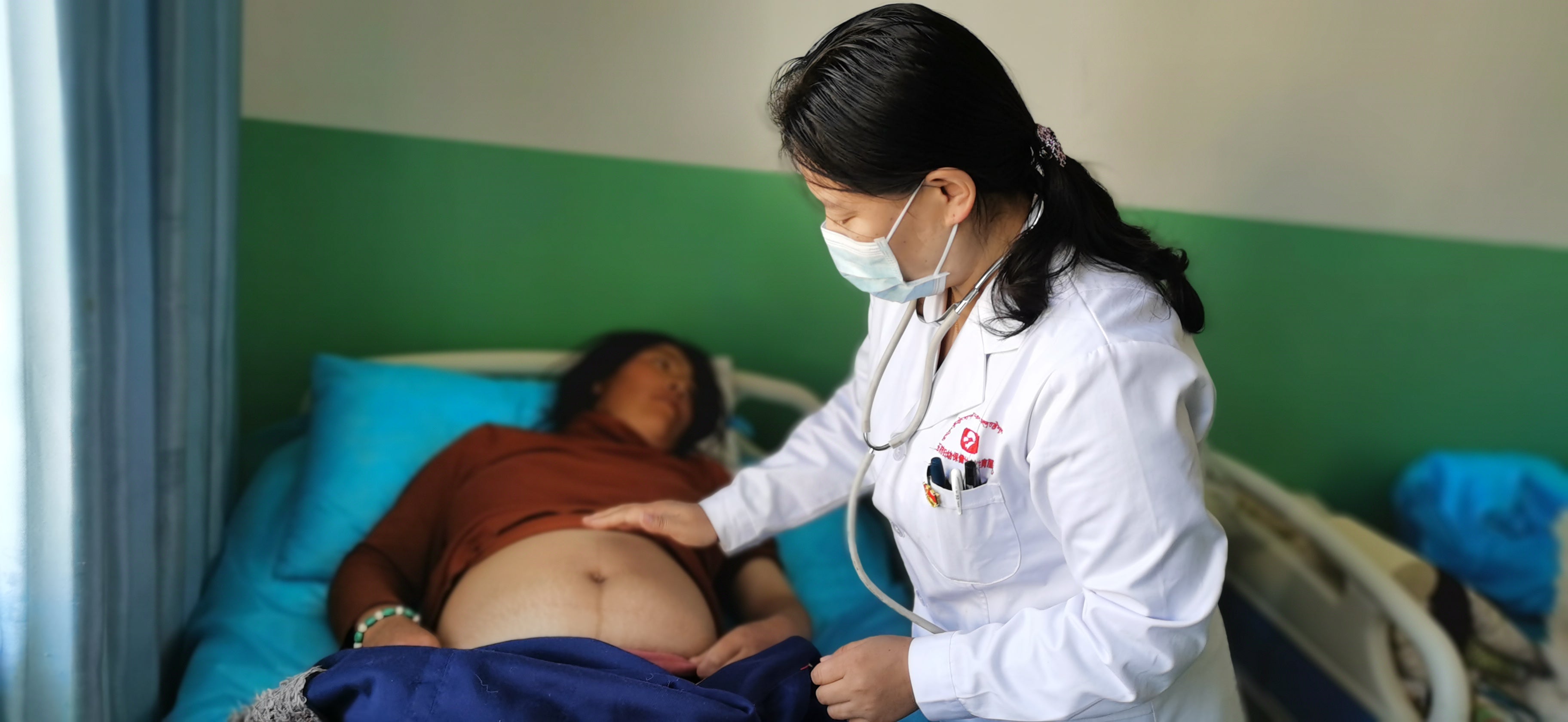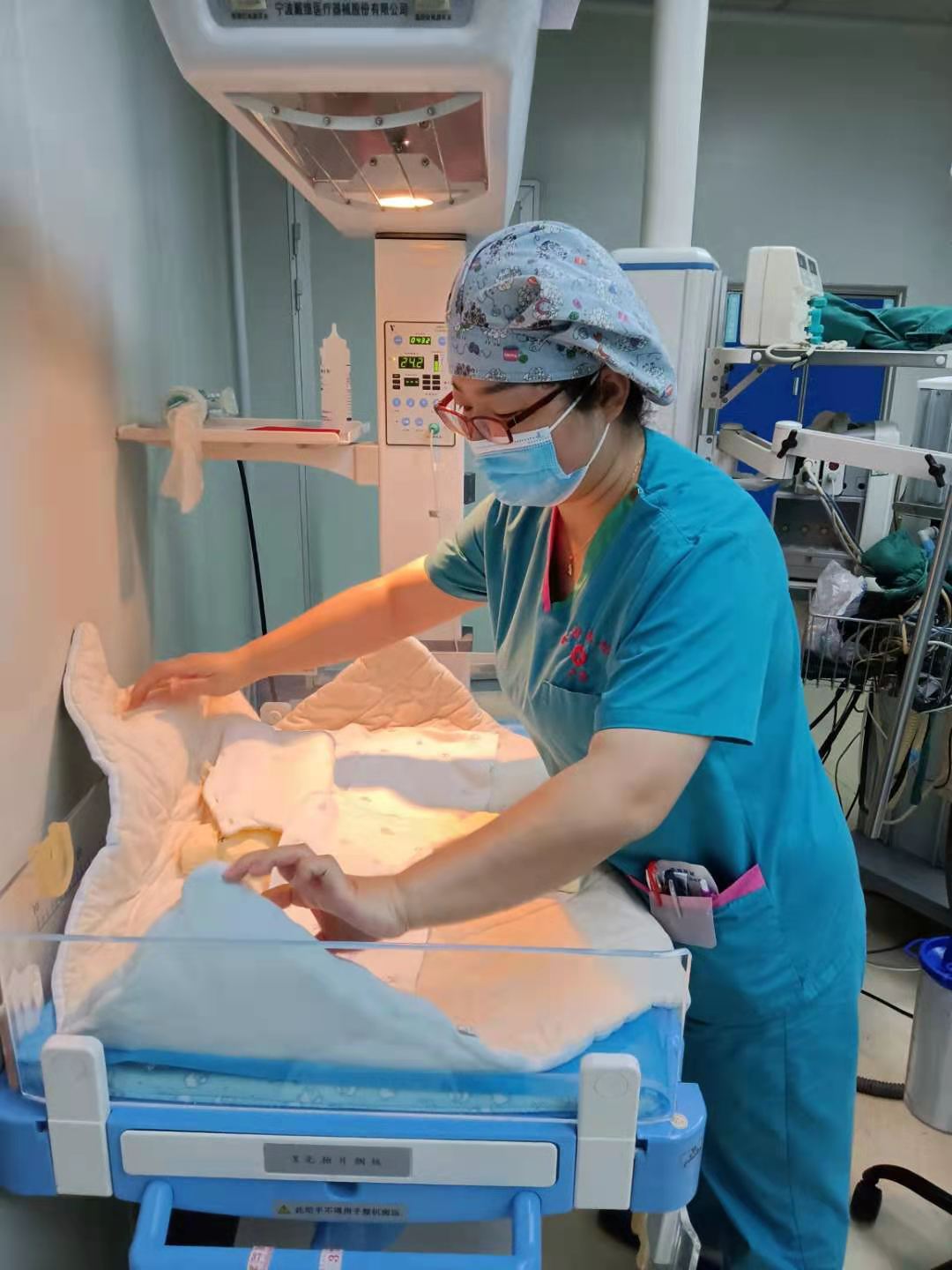Cairen Sangji is a Tibetan doctor with the Yushu County Maternal and Child Health Hospital. Before undertaking the national standardized midwifery training in 2020, she had been providing maternal care including midwifery in her community for 15 years.

Cairen Sangji conducts an antenatal examination for a local Tibetan woman in Yushu, Qinghai Province. ©Yushu County Maternal and Child Health Hospital
“As a doctor working in the field, I carry out multiple tasks including attending births, procuring medicines and providing outpatient services such as cervical and breast cancer screening,” says Cairen.
In China, midwifery is not registered as an independent profession. In the MCH hospital Cairen works, there are three health personnel providing midwifery service--two attending physicians including Cairen, and one nurse.
Midwifery training increases access and reduces cost
In 2020, Cairen was supported by the UNFPA project in Qinghai Province, which is one of the remote and less developed provinces in China, to take part in a three-month standardized midwifery training at West China Second University Hospital of Sichuan University, facilitated by UNFPA China and the Chinese Maternal and Child Health Association.
“I am now more confident with my skills for providing quality care, and more women are willing to deliver in our hospital,” says Cairen.
In the county hospital, many high-risk pregnant women seeking services were referred to the higher-level hospital, due to limited midwifery capacity of the hospital.
“I learned many professional skills that I did not know before,” says Cairen. “One new skill I mastered is administration of maternal anesthesia for perineal muscle relaxation.”
Cairen’s practice of new skills supported the safe delivery of a 41-year-old pregnant woman in the hospital, which she would not have managed without having gone through the training course.
“The safe labour in our local MCH hospital is really important for a local woman. If she can deliver successfully here and the cost is within CNY1,200, it will be fully covered by the government. In other words, it means free delivery.”
“Otherwise, we will have to refer her to the higher-level hospital, and she will have to borne a double cost associated with the delivery,” Cairen adds.
“The more and better skills we have, the more women and families we can help.”
Midwifery training contributes to respectful maternity care
Similar to Cairen, Tingting’s hospital in Linfen Prefecture, Shanxi Province also faces a shortage in midwifery force.

Tingting Li provides newborn care services in Linfen, Shanxi Province. ©Linfen Prefecture Maternal and Child Health Hospital
“I am also a mother, and I know the difficulties that women face during labour,” recalls Tingting Li.
“All the medical jargons and anxious attitude can only intensify the situation and make a pregnant woman disturbed.”
The standardized training in Chengdu has inspired Tingting to think more about respectful care during the birth attendance process. Last year, Tingting and her team supported a pregnant woman being in labour for 16 hours.
Using her professional skills, Tingting continued to encourage the woman and accompanied her during the whole process.
“The better you take care of her, the more she will trust and cooperate with you,” Tingting explains.
For another woman with difficulties with hearing, Tingting used notes to communicate with her and finally attended a safe delivery of a baby with a weight of 3900 grams.
“A well-trained midwife shall be both as gentle and reliable as a neighbourhood sister, and as strong and calm as a powerful woman able to address any safety issues using professional skills.”
On the occasion of the International Day of the Midwifery 2021, we honour the contribution of all midwives to humanity, and highlight the evidence for more investment in midwifery as an essential element of health care.
Note to editors:
Ensuring universal access to reproductive health and rights including safe motherhood is a top priority for UNFPA.
In China, UNFPA has been working with the National Health Commission, Chinese Maternal and Child Health Association, Peking University Health Science Center and other partners for over ten years towards a more favorable policy environment for midwifery development in China.
During 2016-2020, UNFPA supported efforts in enabling policy environment, quality education and training for midwives, and promoting high standards for midwifery service delivery. The collaboration has contributed to remarkable achievements such as:
- established a midwifery bachelor’s degree programme in 8 medical universities which was adopted by Ministry of Education in 2017
- enrolled ten standardized training bases for midwives
- set up the Chinese Midwives’ Society of the Chinese Maternal and Child Health Association
- initiated national standardized training and examination for midwives
- translated and published a midwifery textbook that standardized and professionalized the midwifery education in China.
In the new cycle of cooperation (2021-2025) between UNFPA and the Government of China, UNFPA will continue supporting the efforts of national partners in promoting midwifery as an independent health profession and developing a quality midwifery workforce.

